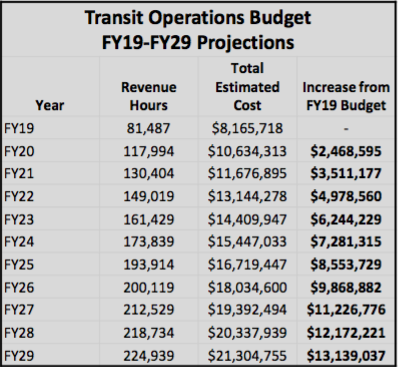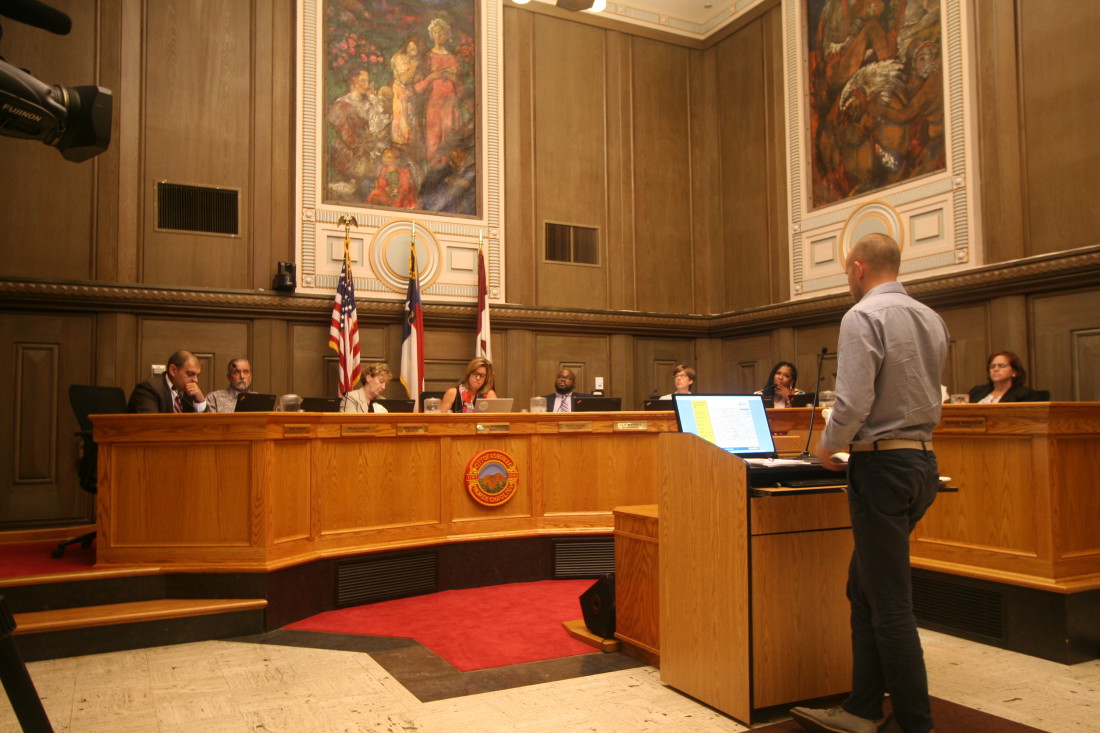When you can’t afford a vehicle, public transit serves as a portal to just about everything — food, healthcare, work, school and more. At least, that’s how transit advocates believe it should work.
Many supporters in Asheville feel that the current options offered by the city don’t do enough to serve the members of the community that need them.
“Over the past month in particular we’ve seen a lot — a lot — of service interruptions,” Vicki Meath, the executive director of Just Economics, told members of City Council on July 24. Buses have also been breaking down, she said. “The last month has been pretty extreme, and that’s because we didn’t spend the capital we needed to years ago to have the bus replacements.”
Now, officials hope a new push by the city could mark a vital transition in the quality of service.
Asheville City Council unanimously approved an expansive new transit master plan — a vote that drew applause from many in the audience. The plan took shape over the past several months and was refined using input provided by members of the community.
“Access, access, access,” Rev. Amy Cantrell, the founder of the nonprofit BeLoved Asheville, told City Council. “That’s what this plan does. … Our system has been tired and broken and dysfunctional for a long while, and thanks to dedicated prior advocates, dedicated Council members, dedicated city transit staff, we have worked to fix many of these struggles together.”
Justin Willits, a transportation planner with Florida-based consulting firm Tindale Oliver, said the plan would increase the number of buses in the fleet to 36 (plus an extra 16 in reserve) and more than double the number of service hours to about 225,000 by 2029. The plan also includes additional routes and anticipates the need to construct a $50 million administrative and maintenance facility, the cost of which could be mitigated by a match from the federal government.

Officials project that the city’s transit operations budget, which in FY 2019 totals $8,165,718, will balloon to $21,304,755 in FY 2029. Over the next two fiscal years, the city will need to budget for a $2.5 million increase in the transit operations budget in FY 2020, an $18,000 local match for a facility study, and a $10 million local match for building and designing the new facility. “Once we do that facility study, we’ll have a better idea of what the actual cost will be,” said Elias Mathis, transit planning manager for the city. “We’re assuming that we would have an 80 percent federal match to help pay for that.”
Tindale Oliver also looked at the potential impact of making the system free to ride and recommended that Asheville test the impact by implementing fare-free weekends. Otherwise, Willits said, the increased ridership could mess with the system. “Going straight fare-free on the weekdays immediately would have the potential to overburden the system where you may be leaving people at the bus stops because you don’t have the capacity to serve all the demand that’s out there.”
Steve Foster, a representative from the Council of Independent Business Owners, asked City Council to run the system in a fiscally responsible manner while also addressing the poor conditions of city streets.
“Low repair of streets and annual increased subsidies to a bus system that continually runs on these dilapidated streets equals disaster,” he said, reading from a prepared statement. “This is not sustainable. You must figure out a way to operate a bus system in a more break-even manner and at the same time repair the streets that they need to utilize.”
Council member Julie Mayfield said the goal of the plan is to make life better for the people who live here.
“This is about building a transit system that allows you to live here without a car, which makes Asheville eminently more affordable for more people,” she said.
Mayor Esther Manheimer echoed Mayfield, noting that she was pleased to hear that the community input process worked. “And now we just gotta find the money,” she said. “That’s our job.”
GE gets economic development incentives
Council unanimously approved up to $900,960 in economic development incentives to encourage GE Aviation to make $105 million investment in its local facility. The company previously received $685,000 from Buncombe County in early June.
The investment was announced on March 1, and officials project it will incrementally produce 131 new jobs. According to the county’s agreement with GE, 105 of those new jobs will pay $38,356 excluding benefits, and 26 will pay an annual salary of $92,000. Presently, 424 people are employed at the facility.
Manheimer explained that these incentives would act more as a rebate than a grant.
“Companies that make investments in Asheville and grow their footprint by investing dollars in building buildings and filling them full with equipment and hiring people have to pay more property taxes,” Manheimer said. “To the extent they grow how much property tax they have to pay the city, they can be eligible to receive a portion of that back over a period of time.”
During the five-year grant period, Asheville will receive 50 percent of new property tax revenues on top of the company’s existing property tax payments. After that, the city would receive 100 percent of the increased tax revenue. City staff wrote in a report that the first payment of $175,000 would be budgeted for FY 2021.



“You must figure out a way to operate a bus system in a more break-even manner” says Mr CIBO.
No bus system operates in a break-even manner. (Unless you count tour buses, and as fun as LaZoom is, it’s not public transit.) Once again, the question is whether the externalities justify the subsidy.
Mr. CIBO Foster makes a GREAT point about our dilapidated streets…the city managers and council should be very embarrassed and ashamed of street conditions, but they dont give a shite.
I also agree with Mr. Foster. Asheville’s streets are in horrible condition. It’s like Ashville’s Public Works Department has been on break for the last decade, but their service has really fallen off a cliff in the last 4-5 years. It’s like they stopped working at all. But, how can they be responsive to normal needs; they’re too busy spending a million and a half dollars paving ONE road (as they gleefully announced last week).
I wish they’d throw the PW Director back in whatever NC-DOT hole they dug him out of and hire someone who knows how to get work done.
LOL it’s going to make it more affordable by taxing people out of their cars lulz. And increasing their property taxes as well lulz.
Maybe we can even do bike lanes ala Seattle. 7 million per a mile.
I’d rather pay for bike lanes than pay to expand a terrible bus system.
“I’d rather live in a van than pay to fix a dilapidated house.”
What makes a bad bus system better? Frequency and reliability.
And it’s weird how we never hear about people “taxed out of their cars.” Maybe because it’s not a thing.